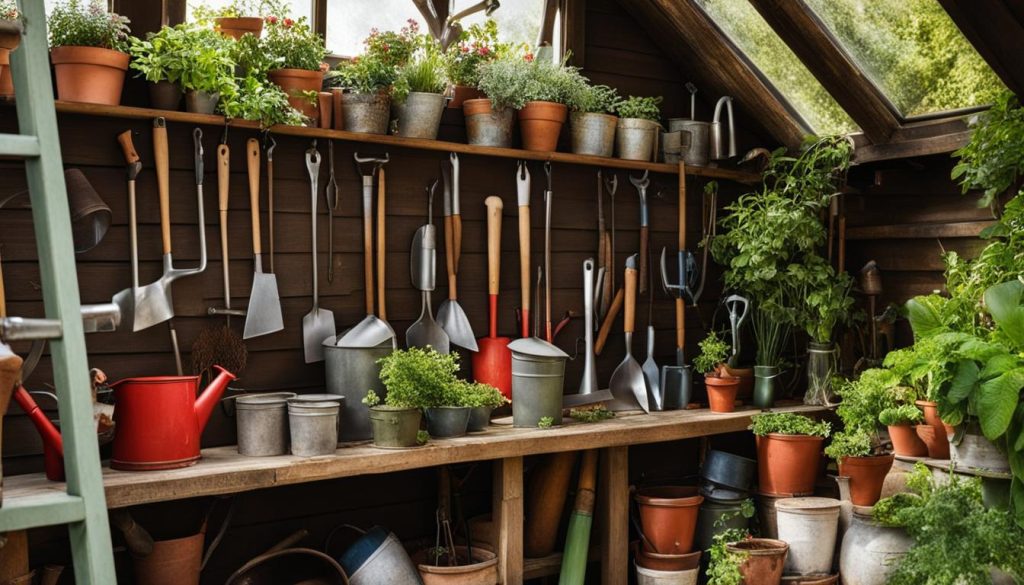
How to Look After Your Garden Tools for Longevity
Proper care and maintenance of your garden tools are essential for their longevity and optimal performance. By following these tips, you can ensure that your gardening tools will last for many years, saving you time and money in the long run.
Key Takeaways:
- Garden tool care is crucial for their longevity and performance.
- Regular cleaning helps prevent dirt buildup and the spread of pests and diseases.
- Sharpening your garden tools ensures clean and efficient cuts.
- Proper storage in a dry environment helps prevent rust and damage.
- Copper garden tools require special care and regular cleaning.
Importance of Cleaning Garden Tools
Properly cleaning garden tools is an essential part of their maintenance and care. Neglecting to clean your tools can lead to a variety of problems, including the buildup of dirt and grime, the spread of pests and diseases, and the deterioration of the tool’s performance and longevity. By regularly cleaning your garden tools, you can ensure that they continue to function optimally and remain in good condition for years to come.
When it comes to cleaning garden tools, a simple and effective method is to wash them with soapy water. This will help remove any dirt, debris, and residue that may have accumulated during use. Additionally, using a brush to scrub off stubborn dirt can ensure a thorough cleaning. It is recommended to clean your tools after each use, as well as before storing them, to prevent any potential contaminants from spreading to plants and other tools.
By maintaining a clean set of tools, you can also minimize the risk of pests and diseases affecting your garden. Pests and pathogens can easily hide and thrive in dirty tools, leading to the infestation of plants and the spread of diseases. Regularly cleaning your garden tools can help prevent this by removing any potential breeding grounds and minimizing the chances of contamination.
Overall, cleaning garden tools is a simple yet crucial practice that should not be overlooked. By incorporating regular cleaning into your gardening routine, you can ensure the longevity and optimal performance of your tools while safeguarding the health and productivity of your garden.
Benefits of Cleaning Garden Tools:
- Prevents dirt buildup and grime
- Reduces the spread of pests and diseases
- Maintains tool performance and longevity
- Minimizes the risk of contamination
- Preserves the health and productivity of plants
Sharpening Garden Tools for Optimal Performance
When it comes to garden tool care, sharpening is an essential step to ensure optimal performance. Blunt blades not only make gardening tasks harder, but they can also cause damage to plants. To maintain sharpness, it’s important to use the right techniques and tools.
The first step in sharpening your garden tools is to use oil on the blade to prevent rust and facilitate the sharpening process. Apply a few drops of oil and spread it evenly across the blade. Next, use a file or sharpening stone to gently file the edges of the blade at a 20-degree angle. Make sure to maintain a consistent angle throughout the process to achieve a sharp edge.
After sharpening, it’s crucial to remove any excess oil from the tools to prevent it from transferring to plants or surfaces. Wipe the blade with a clean cloth or paper towel until it is free from oil. This will also help to prevent dirt and debris from sticking to the blade, keeping your tools in top condition.
Sharpening Tools for Different Types of Garden Equipment
Not all garden tools require the same sharpening technique. Here’s a quick guide on sharpening different types of garden equipment:
- Pruning Shears: For pruning shears, sharpen both blades by following the same sharpening process mentioned earlier. Make sure to remove any rust or sap buildup before sharpening.
- Lawn Mower Blades: Lawn mower blades require a more precise sharpening technique. It’s recommended to remove the blades from the mower and use a bench grinder or a sharpening kit specifically designed for lawn mower blades. Follow the instructions provided with the kit or grinder for best results.
- Shovels and Spades: These tools generally do not require frequent sharpening. However, if you notice the edges becoming dull or chipped, use a file to reshape them. File the edge at a slight angle to restore sharpness.
By regularly sharpening your garden tools, you can ensure clean and efficient cuts, making your gardening tasks easier and more enjoyable. Remember to maintain a consistent angle and remove excess oil to keep your tools in optimal condition.
General Maintenance Tips for Garden Tools
Proper maintenance is crucial for the longevity of your garden tools. By following these general maintenance tips, you can keep your tools in good condition and avoid the need for frequent replacements.
Proper Storage
One important aspect of maintenance is storing your garden tools correctly. Instead of standing them upright, hang them to prevent bending or warping. This also allows for proper air circulation, preventing moisture buildup that can lead to rust. Give each tool its own space to avoid tangling or damage.
Soil Removal
After each use, make sure to brush off any soil from your tools. Soil buildup can promote the growth of bacteria and fungi, leading to potential diseases in your garden. Use a brush or a cloth to remove the dirt, paying particular attention to any crevices or hard-to-reach areas.
Disinfection
To prevent the spread of diseases between plants, it’s essential to disinfect your tools regularly. You can use a solution of bleach and water or a commercial disinfectant to kill any pathogens. After disinfecting, make sure to rinse the tools thoroughly and allow them to dry completely before storing.
Wooden Handle Care
If your garden tools have wooden handles, they require additional care. Sanding the handles will help remove any splinters or rough surfaces. Apply a coat of linseed oil to keep the wood moisturized and prevent cracking. Regularly inspect the handles for any signs of damage or wear and replace them if necessary.
By following these general maintenance tips, you can ensure that your garden tools remain in excellent condition for years to come. These practices will not only save you money on frequent replacements but also make your gardening tasks more efficient and enjoyable.
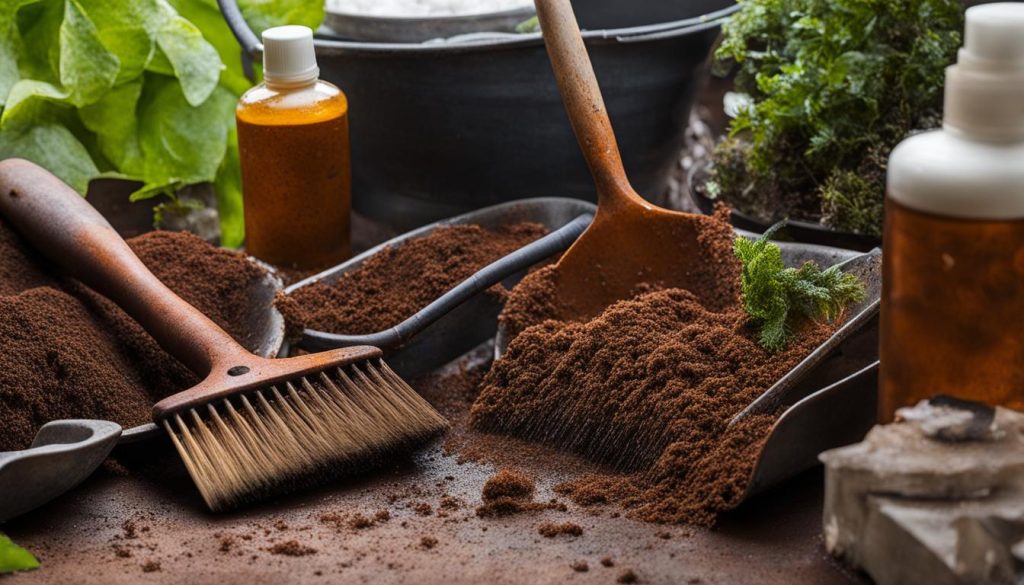
The Importance of Proper Storage for Garden Tools
Proper storage is crucial for maintaining the longevity and performance of your garden tools. When tools are not stored correctly, they are at risk of rusting, becoming damaged, or losing their effectiveness. By adopting the right storage practices, you can protect your tools and extend their lifespan.
To start, it’s essential to store your garden tools in a dry and moisture-free environment. Moisture can cause rust and corrosion, leading to decreased functionality and potential damage to your tools. Find a storage space that is well-ventilated and free from humidity. If you don’t have an indoor storage area, consider using waterproof covers to protect your tools from rain or snow.
In addition to keeping your tools dry, it’s important to hang them up properly. Hanging your tools allows for proper air circulation, preventing moisture buildup and reducing the risk of rust. You can use wall hooks or a pegboard to hang your tools neatly, ensuring they are easily accessible and organized.
When hanging your tools, avoid placing them directly on the ground or in contact with grass or mud. Ground moisture can seep into the metal parts of the tools and accelerate rusting. If possible, elevate your tools off the ground by using a rack or shelf.
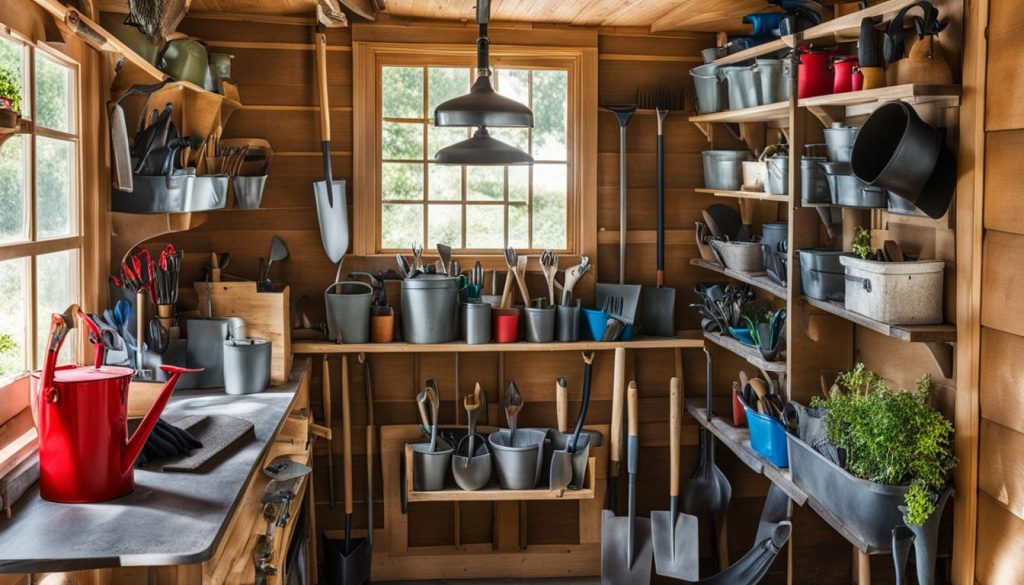
The Importance of Proper Storage for Garden Tools
| Benefits of Proper Storage | Consequences of Improper Storage |
|---|---|
| Prevents rust and corrosion | Increased risk of rust and corrosion |
| Extends tool lifespan | Shortened tool lifespan |
| Preserves tool functionality | Decreased tool effectiveness |
| Reduces the need for frequent replacements | Higher cost due to frequent tool replacements |
In summary, the proper storage of garden tools is essential for maintaining their condition and ensuring their longevity. By storing your tools in a dry and moisture-free environment, hanging them to allow for proper air circulation, and avoiding contact with grass or mud, you can protect your tools from rust, corrosion, and damage. Follow these storage practices to keep your garden tools in optimal condition and ready for use whenever you need them.
Cleaning and Maintenance Tips for Lawn Mowers
Maintaining your lawn mower is vital for its longevity and performance. By following these cleaning and maintenance tips, you can keep your lawn mower in good working condition.
Cleaning
After each use, it’s essential to wipe down your lawn mower to remove any grass clippings and debris. Use a damp cloth or sponge to clean the exterior surfaces. Pay attention to the blade and cutting deck, as they tend to accumulate grass clippings. Use a brush or putty knife to scrape off any hardened debris.
Every few weeks, give your lawn mower a more thorough cleaning. Start by removing the spark plug wire to prevent accidental starting. Then, tilt the mower on its side (with the air filter facing up) and use a hose to spray water underneath the deck to remove any built-up grass and dirt. Be careful not to spray water directly into the engine or on the air filter.
Maintenance
In addition to regular cleaning, there are a few other maintenance tasks you should perform to keep your lawn mower running smoothly. One crucial step is to check and replace the oil regularly. Consult your lawn mower’s manual for the recommended oil type and intervals for oil changes. Remember to always drain the old oil properly and dispose of it according to local regulations.
Another important maintenance task is to sharpen the blades. Dull blades can tear the grass instead of cleanly cutting it, leading to an uneven lawn appearance and potential damage to the grass. Use a blade sharpener or file to sharpen the cutting edges, following the manufacturer’s instructions. It’s also a good idea to balance the blades after sharpening to ensure even cutting.
Proper Storage
When the mowing season is over, it’s crucial to store your lawn mower properly. Clean the mower thoroughly before storing it to prevent the accumulation of dirt and debris. Consider applying a thin coat of oil to metal surfaces to protect against rust. Find a dry and sheltered storage space, preferably indoors, to prevent moisture damage. If storing the lawn mower outside, use a waterproof cover to shield it from the elements.
By following these cleaning and maintenance tips, you can keep your lawn mower in excellent condition, ensuring it will be ready for use when the grass starts growing again. Regular maintenance not only extends the lifespan of your lawn mower but also ensures that it operates at peak performance, resulting in a healthier and more beautiful lawn.
| Maintenance Task | Frequency |
|---|---|
| Cleaning after each use | After every mowing session |
| Thorough cleaning | Every few weeks |
| Checking and replacing oil | As recommended in the manual |
| Blade sharpening | As needed or once a season |
| Proper storage | When mowing season is over |
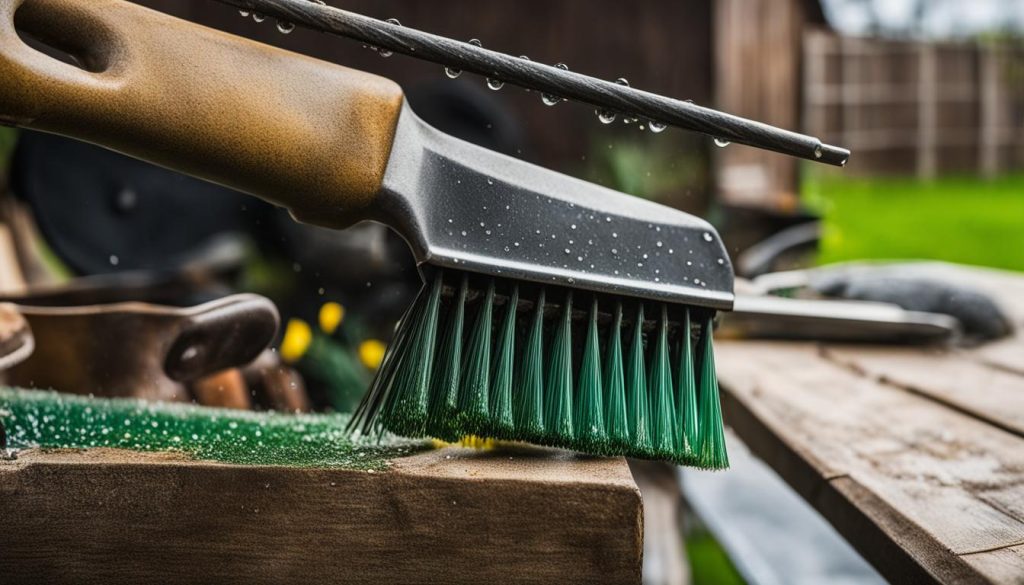
Special Care for Copper Garden Tools
Copper garden tools are a popular choice among gardeners for their durability and aesthetic appeal. Unlike other metal tools, copper does not rust, making them low-maintenance and long-lasting. However, they still require proper care to maintain their shine and functionality. Here are some tips on how to care for your copper garden tools.
“Copper garden tools are not only practical but also add a touch of elegance to any garden. To keep them looking their best, regular cleaning is essential. Simply wash them with warm soapy water and a soft cloth to remove dirt and grime. If there are stubborn stains or tarnish, you can use a mixture of lemon juice and salt as a natural cleaning solution.”
After cleaning, it’s important to dry your copper tools thoroughly to prevent water stains and to maintain their shine. Use a clean cloth or towel to remove any moisture and ensure they are completely dry before storing them. Avoid using abrasive materials or cleaners that may scratch the surface of your copper tools.
Unlike other garden tools, copper tools do not require oiling or WD40. In fact, oil can leave residue and diminish their natural shine. Instead, regular cleaning with soap and water is sufficient to keep your copper garden tools in good condition. If you notice any signs of tarnish, you can use a copper polish to restore their luster.
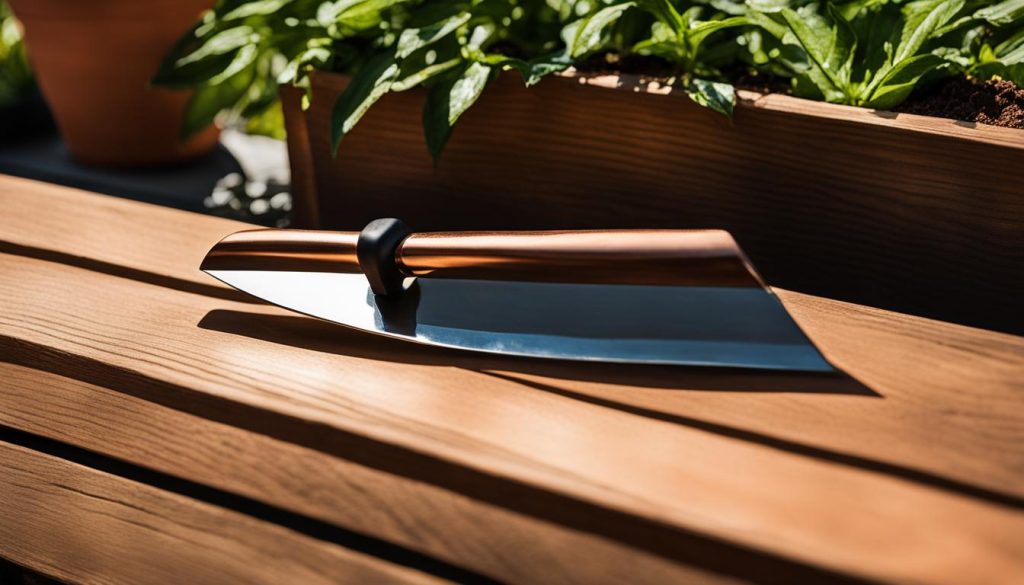
Maintaining the Beauty of Copper
To maintain the beauty of your copper garden tools, you can also use steel wool to remove tarnish and restore their shine. Gently rub the surface with steel wool, following the grain of the metal. This will help remove any tarnish or discoloration and bring back the natural glow of the copper.
It’s important to store copper garden tools properly to prevent damage and maintain their longevity. Keep them in a dry and well-ventilated area to prevent moisture buildup. Hanging them on a rack or pegboard is an excellent way to keep them organized and easily accessible. Additionally, storing them away from other tools can prevent scratches and dents.
By following these simple care tips, you can ensure that your copper garden tools remain beautiful and functional for years to come. With their timeless appeal and durability, they will continue to be a valuable asset in your garden.
Conclusion
Proper care and maintenance of garden tools are essential for their longevity and optimal performance. By following these garden tool care tips, you can ensure that your tools will last for many years, saving you time and money in the long run.
Cleaning your garden tools after each use is crucial to prevent dirt buildup and the spread of pests and diseases. Regular sharpening of the blades will ensure clean and efficient cuts, making your gardening tasks easier. Additionally, storing your tools in a dry and moisture-free environment will help prevent rust and damage.
Remember to hang your tools instead of standing them, brush off soil after use, allow them to dry before storage, and give each tool its own space. If you have copper garden tools, clean them with soap and water to maintain their shine. By following these simple maintenance tips, you can extend the lifespan of your garden tools and keep them in excellent condition for years to come.